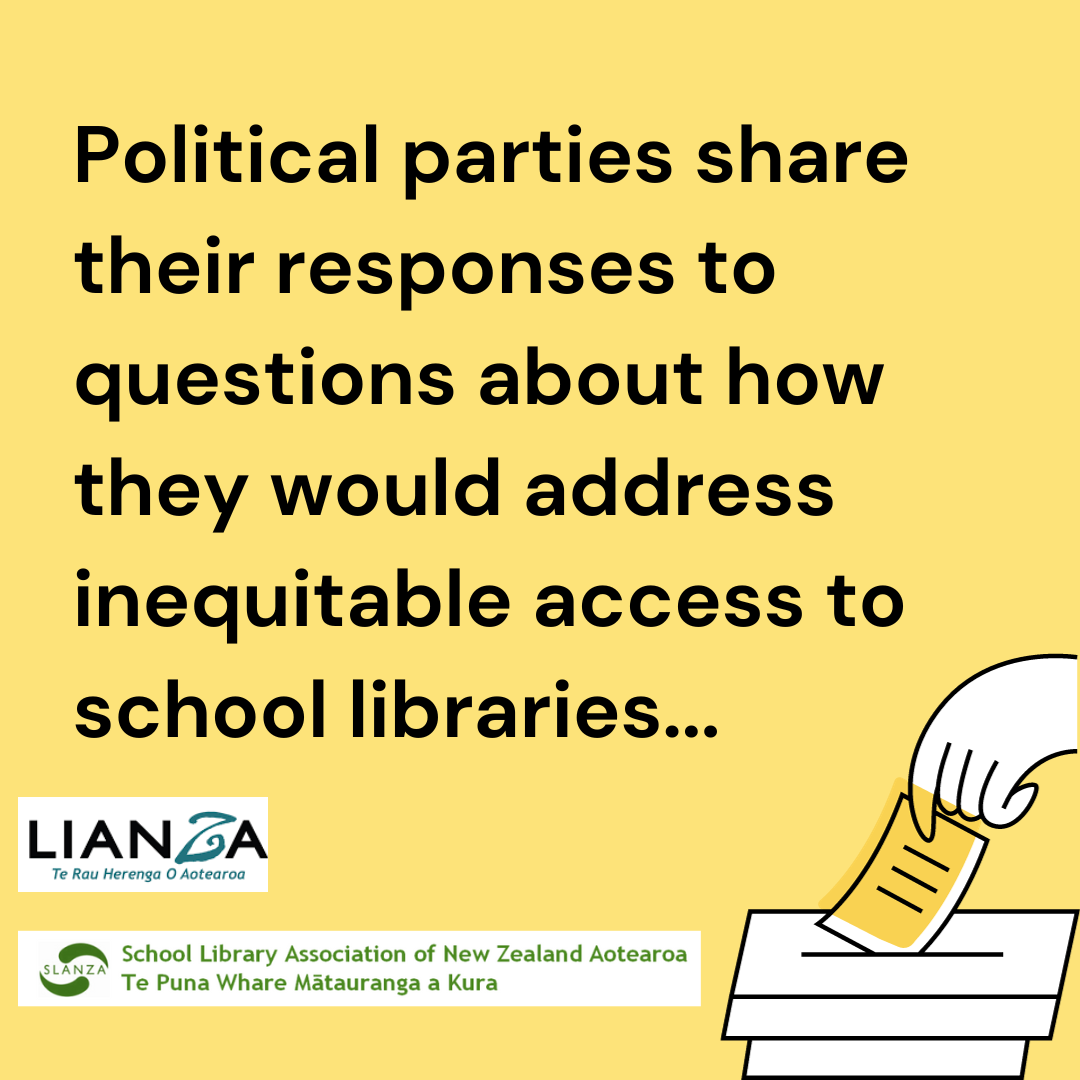|
Questions prepared by LIANZA and SLANZA were sent to New Zealand political parties to answer before the election in October 2023. They included key questions for the sector. We have showcased the school library specific questions and responses below.
You can read all the questions relating to the wider library sector here: 2023 Election questions for library and information sector Equitable access to school libraries There is no requirement or specialised funding for schools in Aotearoa New Zealand to provide library spaces, services or staff. This means most students don’t have access to a school library run by a school librarian, even though only 64.6 percent of 15-year-olds in Aotearoa New Zealand have basic proficiency in reading and maths (UNICEF, 2020), and “reading for pleasure is the single biggest indicator of a child’s future success, more than family circumstances, parents’ educational background or income” (OECD, 2002). A survey of all Aotearoa New Zealand schools highlighted that a library is essential for promoting and supporting reading for pleasure, achieving literacy standards, strengthening inquiry learning and teaching and enhancing students’ social and emotional learning and well-being (National Library of New Zealand, n.d.). What will your party do to address the inequitable access of Aotearoa New Zealand primary and secondary students to a school library staffed by a qualified librarian? The Green Party Libraries are a crucial part of school communities and foster curiosity and ideas in the minds of Aotearoa’s future generations. The Green Party is committed to ensuring Aotearoa’s schools, both primary and secondary, have access to a school library staffed by a qualified librarian. We support adequate and targeted funding so primary and secondary students have access to library services. The ACT Party ACT shares the horror at collapsing literacy standards in New Zealand. ACT’s solution is to have equity-based funding per student to attend the schools they and their parents want. It should be for individual schools and their boards to make decisions on what is best for their school. The Labour Party We recognise the important work of school librarians and library assistants and that is why as a Government we agreed to a historic pay equity settlement signed in March this year. For school librarians and library assistants, the new pay equity rates will see them receive average pay increases of approximately 10 to 38 percent. Perhaps even more important is the message this settlement sends when you look beyond pay, as it raises the mana of these roles. Despite the benefits of school libraries and librarians, it is important that schools have the flexibility to decide the best use of their resources, to respond to their particular needs, community aspirations and circumstances. These vary greatly. This variability of needs and priorities is why boards have discretion over how they use their operational funding, the people they employ, and the mix of teaching, library and non-teaching spaces. All schools receive resourcing, including for buildings, that can be used to provide a library space, and Ministry of Education data shows most schools have some kind of library or library collection. But mandating the use of space for a library would be a significant departure from how the system currently works. Consistency of resources is not necessarily as important as having the right resources for each school, to best support students to be present, participating and making progress. For example, a very small school may be better to partner with a community library than incur the significant fixed costs associated with having its own library. With a big increase in equity funding this year, and better targeting of that funding, there may well be schools that are now able to invest more in their libraries in ways that help overcome socio-economic barriers to participation and achievement. The National Party Falling literacy rates across the country is one of the key focusses for the National Party, and this has led to the Teaching the Basics Brilliantly policy, which calls for at least one hour of reading, writing and maths every day. Erica and the National Party agree that we need to foster reading in schools as this is the clearest indicator of success for students. It is a concern that students do not have equal access to libraries and books and this is an area that Erica and the National Party would look into if elected. Undoubtedly having access to libraries and librarians is part of the solution for lifting literacy rates across the country. While the National Party are not in the position to make any definitive statements of policy at this stage, this is an area that they will be carefully reviewing and appreciate the information around the benefits of libraries and qualified librarians.
0 Comments
Your comment will be posted after it is approved.
Leave a Reply. |
Categories
All
Archives
July 2024
|


 RSS Feed
RSS Feed